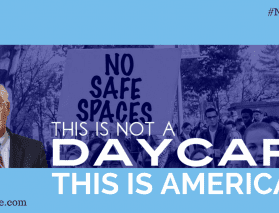Across the nation this past Sunday, October 8, about 1,600 pastors told the IRS to go to – well, let’s just say they gave notice of non-compliance in defense of religious freedom. In an annual event that began in 2008, pastors preached sermons from the pulpit that offered Biblical critiques of specific candidates’ political positions in violation of the Johnson Amendment of 1954. Read the CNN account here.
Videos of many of the sermons were then sent to the IRS as pastors dared them to act. Their goal? Create a test case for the courts to decide whether pastors’ constitutional rights are being violated by the Johnson Amendment and the IRS’s on-going threats to revoke their tax-exempt status.
Coordinating the effort was the group Alliance Defending Freedom. See Alan Sears’ blog on the event here. Lead Senior legal counsel Erik Stanly framed the event this way according to Bob Unruh at WND:
“[T]hey are simply applying Scripture and theological doctrine to the positions held by the candidates running for office,” he said. “Pastors have been applying scriptural teaching to circumstances facing their congregations for centuries.
“This is not ‘political’ speech,” he said. “Rather, it’s core religious expression from a spiritual leader to his congregants. That kind of expression is at the very center of the freedom speech and religion protections in the First Amendment.”
The Problem with Pastors
As a student of non-profit law at Case Western Reserve University while pursuing my MBA in non-profit management, I found religious organizations have much more legal latitude to speak to public policy issues than they think. My experiences with pastors, though, taught me that almost all are terrified of losing their 501(c)3 status.
Imagine the pulpits that prepped public thinking prior to the War for Independence not daring to speak against abuses by the King? I likely wouldn’t be writing this today – nor would you be reading it. They spoke clearly, biblically, and sometimes stridently and specifically about the political issues and figures of the day. There was no IRS charitable status to fear losing. Their life and property? Maybe. But still they spoke.
Pastors should be able to speak with clarity on moral issues regardless of whether those issues affect candidates for public office. It is foolish to say that pastors should speak to issues that pertain to an individual but not about those individuals who want to lead parishioners astray.
Pastors should be able to say that anyone who votes for a candidate who supports the murder of an unborn child is endorsing murder. Certainly President Obama’s track record would qualify his name being on those sermon notes. Pastors should be free to decry egregious violations of our God-given rights such as the Obama administration’s HHS mandate. Pastors should be free to boldly speak of the evil of crushing national debts that enslave our nation and make us servant to the lender. The list goes on.
That’s not to say they should wait for the OK from the IRS to say these things. They should have the courage to speak the truth in love as they ought to obey God rather than men. I don’t recall Biblical prophets, John the Baptist, or Paul checking IRS regs before speaking truth to power. But most pastors won’t touch any issue that might dampen the bottom line.
We worship what we fear. The fact is most pastors worship money and the thought of losing it buys their silence. Even when the text of Scripture would compel them to state the obvious. If you know to do good and don’t do it…. I’m just saying.
The Problem with the IRS
I recall one non-profit law class in which we discussed churches as 501(c)3 organizations. The consensus was that such organizations merited tax-exempt status because they did something more efficiently and effectively than the government could do. On that basis alone, they were deemed worthy of tax-exemption – as if the government were simply paying for a service to society through the back door.
The core assumption was that the government was doing charities, and churches especially, a favor by letting them be exempt from certain taxes.
I posed a challenge to this effect: “Why are we talking as if all money inherently belongs to the government which then chooses whether or not it will grant tax-exempt status to churches based on the utility they perform on behalf of the government?” It seemed to me that this thinking simply made everyone an agent acting on behalf of the civil government.
The answer was revealing as the professor – whose class I enjoyed and found most enlightening – quickly did two things. He politely labeled me as an extremist, “What you are suggesting is a libertarian approach,” and then promptly dismissed the question without answering it. Frankly, I think he had been so deeply steeped in statist thinking for so long that to think any other way seemed unthinkable. His worldview blinded him to some simple truths.
Churches are not tax-exempt because they can do something more efficiently than the government or because they are doing government a favor. They are tax-exempt because civil government has no business tampering with the content of sermons. It is an acknowledgement that God has placed limits on government’s authority. It goes both ways, of course, but unless churches are raising armies and militias to challenge the state authority, the state has little to worry about these days (a.k.a. the Holy Roman Empire).
But churches have much to fear as freedoms so basic as the First Amendment have been subtly stripped away.
If anything, it is the churches that do the government a favor by existing. De Tocqueville wisely noted that when America ceases to be good she will cease to be great. A democratic republic such as ours requires moral depth to function. And what is the mission of churches if not to get into the messiness of people’s lives and help them to do good?
No government but the most brutal can long exist in a society decaying into selfish anarchy. A healthy church and state are both vital to a peaceful and productive society. When one can effectively silence the other, our society loses a critical voice to warn of coming collapse.
Someday soon, pastors may have to choose to walk away from tax-exempt status to faithfully proclaim truth in our culture. Perhaps one of these 1,600 will find out just how soon that will be.











